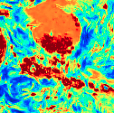
Aggressive forms of treatment such as radiotherapy bring about great discomfort to women diagnosed with breast cancer. There is a great concern that large numbers of women diagnosed with Ductal Carcinoma In-Situ (DCIS) are overrated and therefore do not gain any health benefits from such treatment. Identifying women who are at risk of recurring is key to selectively administering radiotherapy thus reducing overtreatment in the breast cancer population. However identifying patients with such characteristics is a challenging problem which has, to date, been investigated to a limited extent. It is well known changes in tumor morphology reflect underlying changes in tumor biology, therefore it is possible to extract prognostic features from histopathology slides. We hypothesize histopathological characteristics in tissue will provide prognostic information that can be used to stratify patients into those at low and high risk of invasive local recurrence. In doing so, we can identify DCIS patients whose breast cancers are likely to recur aggressively and tailor their treatment accordingly.
Publications
| : Transitioning between Convolutional and Fully Connected Layers in Neural Networks. In: 3rd workshop on Deep Learning in Medical Image Analysis (DLMIA), MICCAI 2017, 2017. |
Project Members
Anne Martel (Principal Investigator)
Shazia Akbar (Researcher)
Nickil Seth (Student)
Tyna Hope (Researcher)
Sharon Nofech-Mozes (Supervising Pathologist)
Sherine Salama (Pathologist)
Eileen Rakovitch (ICES Coordinator)